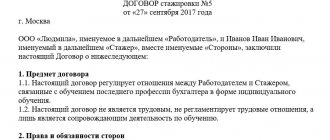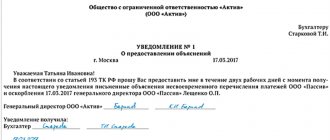Article 198. Student agreement
An employer - a legal entity (organization) has the right to conclude with a job seeker an apprenticeship contract for vocational training, and with an employee of this organization - an apprenticeship agreement for vocational training or retraining on-the-job or off-the-job.
(as amended by Federal Law No. 90-FZ of June 30, 2006)
A student contract with an employee of this organization is additional to the employment contract.
(as amended by Federal Law No. 90-FZ of June 30, 2006)
Understand the concepts
There is no clear definition of an apprenticeship agreement in the Labor Code of the Russian Federation, but the legislation establishes with whom and in what cases an organization can enter into such an agreement, namely:
- when it comes to retraining an existing employee of an organization on or off the job;
- when a job seeker is sent for training.
In practice, HR specialists interpret the provisions of the Labor Code of the Russian Federation differently. There is, for example, a point of view that a student agreement can only be drawn up for internal forms of training, and is not suitable for attracting an educational institution.
Another controversial point is the nature of the relationship between the employer and the trainee, with whom an employment contract has not yet been concluded. A number of specialists rely on letter No. 02-18/05-3937 of the Federal Social Insurance Fund of the Russian Federation dated June 11, 2003, which states that “an apprenticeship agreement with a job seeker is civil and regulated by civil law.” To resolve the issue, it is proposed to conclude an employment contract with such a person first, and only then a student agreement.
“In my opinion, everything in the Labor Code is quite transparent. The use of the apprenticeship agreement is in no way limited to internal training. On the contrary, the result of apprenticeship should be the assignment of qualifications with the issuance of relevant documents. This can only be done by institutions and organizations that have the appropriate license.
As for the contract with a person who is not yet an employee of the company, I think it is correct to note that it is subject to the provisions of both the Civil and Labor Codes. The student agreement in this case is of a mixed nature; the Civil Code of the Russian Federation allows this (clause 3 of Article 421 of the Civil Code of the Russian Federation). When sending an existing employee for training/retraining/upgrading, companies most often conclude with him not a full-fledged apprenticeship contract, but an additional agreement to the employment contract,” explains Irina Savelyeva, head of HR projects at SKB Kontur.
Automatically issue a student agreement in the Kontur-Personnel program.
To learn more
Article 199. Contents of the student agreement
The student agreement must contain: names of the parties; an indication of a specific profession, specialty, qualification acquired by the student; the employer’s obligation to provide the employee with the opportunity to study in accordance with the apprenticeship contract; the employee’s obligation to undergo training and, in accordance with the acquired profession, specialty, qualification, to work under an employment contract with the employer for the period established in the apprenticeship contract; duration of apprenticeship; amount of payment during the apprenticeship period.
The student agreement may contain other conditions determined by agreement of the parties.
Who can become a student?
Most often, organizations send for training those who, by the nature of their activities, are obliged to improve their qualifications. These categories include, for example, employees of internal affairs bodies, government civil servants, medical and pharmaceutical workers.
The need to retrain employees may be caused by production needs, such as changing equipment or transferring an employee to another area of work. In both cases, the employer is required to pay for the training.
It happens that an employee himself expresses a desire to improve his qualifications and undergo training in one or another program. The employer can meet halfway and pay for the training in full or discuss the terms of refund with the employee. This could be, for example, partial compensation from salary or working at an enterprise for a certain period. The agreements must be recorded in the additional agreement to the employment contract.
Article 201. Validity of the student agreement
The student agreement is valid from the date specified in this agreement for the period stipulated by it.
The validity of the student agreement is extended for the duration of the student’s illness, military training, and in other cases provided for by federal laws and other regulatory legal acts of the Russian Federation.
(as amended by Federal Law No. 90-FZ of June 30, 2006)
During the validity period of the student agreement, its content can be changed only by agreement of the parties.
Reimbursement of employer expenses
A sample student agreement with reimbursement of training costs must contain a section on reimbursement of employer expenses. Here you need to indicate:
- what expenses will have to be compensated;
- in what cases will the student be required to reimburse training costs;
- in what cases, when leaving the organization, an employee will not have to return to the employer the money spent on training;
- how long will it take to reimburse the employer for education costs?
- what liability will the employee bear if he does not reimburse expenses in a timely manner? This measure will help the parties avoid misunderstandings.
Article 203. Time of apprenticeship
The apprenticeship time during the week should not exceed the standard working time established for workers of the appropriate age, profession, specialty when performing the relevant work.
Employees undergoing training in the organization, by agreement with the employer, can be completely released from work under an employment contract or perform this work on a part-time basis.
During the period of validity of the apprenticeship contract, employees cannot be involved in overtime work or sent on business trips not related to the apprenticeship.
Student Responsibilities
The contract should indicate the student's responsibilities. He must:
- attend classes at an educational institution;
- study hard. If a contract is concluded with an applicant, this is especially important: good grades will increase the chances of employment;
- complete assignments within the curriculum;
- pass assigned certifications;
- present to the employer the received educational documents, etc.
Please note that the employer has the right to monitor the student’s progress.
Article 207. Rights and obligations of apprentices upon completion of apprenticeship
For persons who have successfully completed an apprenticeship, when concluding an employment contract with the employer under whose contract they were trained, a probationary period is not established.
If the apprentice, at the end of the apprenticeship, without good reason, does not fulfill his obligations under the contract, including not starting work, he, at the request of the employer, returns the scholarship received during the apprenticeship, and also reimburses other expenses incurred by the employer in connection with the apprenticeship.
Apprenticeship duration
Depending on the duration of the course, the validity period of the student agreement is determined. The apprenticeship period may be extended if this is due to the trainee’s prolonged illness, military training, and in other cases provided for by the legislation of the Russian Federation.
It is also worth specifying the conditions for early termination of the contract. This may be a dishonest attitude towards training - absenteeism without a good reason, unsatisfactory results of certifications, or there may be medical contraindications to the performance of certain job functions.
If a student, on his own initiative, interrupts his studies or does not begin work upon completion, the organization has the right to demand the return of funds transferred to the educational institution and paid in the form of a scholarship.
Student agreement: subtleties of design and application
“HR service and personnel management of the enterprise”, 2012, N 4
APPRENTICE AGREEMENT: SUBTLES OF DESIGN AND APPLICATION
With the introduction of the Labor Code, companies at the legislative level were given the opportunity to train personnel for their own needs using external specialists or on their own. The opportunity to minimize the risk of losing personnel after training and legally secure the fact of investing money in a specific employee is realized with the help of an apprenticeship agreement. The article reveals the features of concluding various types of student agreements and discusses the practice of their application.
During the Soviet economy, there was no particular need for a student agreement. The centralized solution of all issues has created a coherent system of personnel training for enterprises and organizations. This was a system of approved plans for the recruitment of applicants, their subsequent distribution among enterprises, and the training of young specialists by mentors, which was implemented through the relevant educational institutions and training teams.
With the advent of new times, public education began to lag far behind the needs of enterprises, and companies independently began to resolve the issue of developing and training their employees. On the one hand, the company needed qualified specialists, on the other hand, the risks increased that employees would quit after training. In order to protect the material interests of the employer, in 2001 a whole chapter appeared in the Labor Code of the Russian Federation devoted to the apprenticeship contract. It was improved in 2006, and therefore is still in demand by employers. At the same time, practice shows that many colleagues incorrectly use this type of agreement, so let’s take a closer look at this tool.
Types of contracts
To begin with, let’s define that an apprenticeship contract is drawn up for the purpose of training or retraining a specialist that the enterprise needs. Relations regarding professional training, retraining and advanced training with a given employer are classified in Art. 1 of the Labor Code of the Russian Federation as relations directly related to labor, and are regulated by the norms of the Labor Code of the Russian Federation and other acts containing labor law norms.
In Art. 198 of the Labor Code of the Russian Federation lists only two types of apprenticeship agreements that an employer has the right to conclude:
— for vocational training with a job seeker;
— with an employee of this organization for retraining on the job or without interruption from work.
In fact, these are two different agreements governing two types of relations. Thus, an apprenticeship agreement with a job seeker is of a civil law nature, and an apprenticeship agreement with an employee of a given organization for retraining on-the-job or off-the-job is an addition to the employment contract. An analysis of judicial practice shows that employers enter into both an additional apprenticeship agreement and an addition to the employment contract. We note that regardless of the form, such a document must contain all the necessary conditions provided for by the Labor Code of the Russian Federation.
An apprenticeship agreement with a job seeker is in many ways similar in content to an apprenticeship agreement with an employee of a given organization for vocational training. Its main difference is that there are no labor relations between the parties to the transaction at the time of its conclusion.
Both of these agreements are concluded with the employer, which is a legal entity, and only for training conducted by the employer himself. Training with the involvement of training organizations, according to many lawyers, is the subject of civil regulation. Therefore, you should not conclude a student agreement, but a training agreement at the expense of the employer.
For your information. The logic of experts, in particular Yu. P. Orlov, is based on three “pillars” - the historical development of the concept of “apprenticeship agreement”, the definition of the parties to the agreement and the industrial nature of the apprenticeship agreement itself. In the first case, the apprenticeship contract, even in Soviet labor legislation, was considered as the basis for the emergence of legal relations for vocational training or retraining carried out directly at work. In the second case, the parties to the apprenticeship agreement are the employer - an individual - entrepreneur or legal entity and the student - an individual (employee or job seeker), as expressly stated in Art. Art. 198 and 199 of the Labor Code of the Russian Federation. And thirdly, which causes the greatest controversy among specialists, the nature of the student agreement itself is based on labor relations and contradicts civil law norms. However, initially, in the first edition of the Labor Code of the Russian Federation, the student agreement was considered as a civil contract, regulated by civil legislation and other acts containing civil law norms.
According to the St. Petersburg School of Law, in particular S.P. Mavrin, the difference between an apprenticeship agreement and a civil law agreement for the provision of paid services lies primarily in different purposes. The purpose of the apprenticeship contract pursued by the employer is to train personnel for production. The purpose of the contract for the provision of paid services is that the contractor, fulfilling the customer’s task, receives remuneration for the services provided (clause 1 of Article 779 of the Civil Code of the Russian Federation). Under an apprenticeship agreement, the employer independently determines the need for professional training for its own needs, organizes training at its own expense and pays a stipend to the apprentice. That is, it is not the student who orders and pays for training, which would be typical for civil law relations. The result of training is not the service provided, but the labor relationship that subsequently arises, which is why experts define the nature of the student agreement as an agreement within the scope of labor law.
In practice, employers often enter into two contracts: one with the organization that trains the employee, and the other with the employee who will be trained in this institution. We also note that, despite experts classifying contracts between an employer and a student with the involvement of a training organization as other types of contracts than an apprenticeship, in law enforcement practice the courts classify such types of agreements as apprenticeships and apply labor legislation. At the same time, if a third-party organization is involved, it is more correct to conclude with the employee not a student agreement, but an additional agreement to the employment contract, specifying all the necessary conditions in it.
Arbitrage practice. JSC Russian Railways has a common practice of concluding agreements with educational institutions, on the basis of which the joint-stock company trains new employees and retrains existing ones. In this case, apprenticeship agreements are concluded with employees, and less often - training agreements. Judicial practice is full of examples of filing claims in various courts for reimbursement of training costs. As a rule, the courts, using labor legislation, decide the case in favor of Russian Railways. Thus, on January 19, 2012, the Sosnogorsk City Court of the Komi Republic considered case No. 2-123/2012 on the claim of Russian Railways OJSC, represented by the Sosnogorsk branch of the Northern Railway, a branch of Russian Railways OJSC, against an employee for reimbursement of training costs. According to the case materials, an apprenticeship agreement was concluded between the branch of JSC Russian Railways and the defendant for professional training in the profession of “diesel locomotive driver” at the Kotlas Training Center in the period from November 23, 2010 to June 15, 2011. According to the apprenticeship agreement, the defendant was required to undergo training, pass all exams and begin work. But the defendant was expelled from the educational institution due to systematic violation of the center’s internal regulations. Having considered all the materials of the case, the court made a decision based precisely on the norms of Chapter. 32 of the Labor Code of the Russian Federation, in favor of the plaintiff, collecting from the defendant all training costs required by the plaintiff <1>.
———————————
<1> https://sosnsud. komi. sudrf. ru/modules. php? name=bsr&op=show_text&srv_num=1&id=11600081202010927091871000112354.
Arbitrage practice. 05/30/2011 The Rostov Regional Court made a decision regarding OJSC Ugolnaya. He came to the conclusion that the agreement in the case contains elements of a student agreement, and therefore has an “employment law” nature. And this is despite the company’s statements that the agreement between the State educational institution of higher professional education “South Russian State Technical University”, OJSC “Ugolnaya” and the employee is not a student agreement, but a civil one, since it was drawn up in accordance with the Rules for the provision of paid educational services and the norms of Order of the Ministry of Education of Russia dated July 28, 2003 N 3177 “On approval of the approximate form of an agreement for the provision of paid educational services in the field of vocational education” <2>.
———————————
<2> https://actoscope. com/yufo/rostovobl/rostov-sud/gr/3/uchenicheskii-dogovor-06062011-1878246.
Contents of the student agreement
The student agreement must contain mandatory conditions, the absence of any of which in the text of the student agreement can be classified as an administrative offense falling under Art. 5.27 Code of Administrative Offenses of the Russian Federation. Please pay attention to the conditions established by Art. 199 Labor Code of the Russian Federation:
— names of the parties;
— an indication of a specific profession, specialty, qualification acquired by the student;
— the employer’s obligation to provide the employee with the opportunity to study in accordance with the apprenticeship contract;
— the employee’s obligation to undergo training and, in accordance with the acquired profession, specialty, qualification, to work under an employment contract with the employer for the period established in the apprenticeship contract;
- duration of apprenticeship;
— amount of payment during the apprenticeship period.
Arbitrage practice. In the case of the claim of the Uspenskaya Central Regional Hospital against an employee for reimbursement of costs associated with her training, the Armavir City Court of the Krasnodar Territory, at a meeting on August 22, 2011, decided No. 2-1961/11 to refuse the plaintiff. The court indicated that the agreement concluded between the parties does not contain the essential terms of the apprenticeship agreement, namely information about what specialty the employee will be trained in, the period of study, the place of study of the employee and the amount of the scholarship paid and a link to other agreements that prescribe these mandatory conditions <3>.
———————————
<3> https://armavir. krd. sudrf. ru/modules. php? name=bsr&op=print_text&cl=1&id=23600061110211543293121000292203.
The parties to the apprenticeship agreement are the employer and the employee of the organization. The parties to the student agreement are the same as the parties to the employment contract. If we are talking about a student agreement with a job seeker, then the parties are, as a rule, “Enterprise” and “Student” or “Organization” and “Student”.
Let us note that the indication of a specific profession or specialty is a very important point in the text of the contract, since it presupposes the further obligation of the employer to accept the student for a given position (by profession); The student’s responsibilities are, firstly, to undergo training in a given profession or specialty, secondly, to conclude an employment contract and, thirdly, to work under an employment contract in a given position (by profession) for the period agreed upon and indicated below. As a rule, this period ranges from 12 months to five years.
Particular attention should be paid to the fact that the obligation to work in an organization for a certain period of time in accordance with the acquired profession, specialty, qualification, provided for by the apprenticeship contract, loses its force in the event of an internal permanent transfer of the employee to a job not related to the acquired profession, specialty, qualification.
Example 1. An employee, having worked under an employment contract for six months as a storekeeper, became a senior storekeeper as a result of the transfer, so the obligation to work remains. And if the transfer were made to the position of a specialist in the administrative and economic department, then the obligation could terminate if the labor functions of the storekeeper and the specialist differ in at least one point.
The next condition is the employer’s obligation to provide the employee with the opportunity to study in accordance with the apprenticeship contract. It can be expressed both in providing access to the premises for conducting classes, and in providing the appropriate technical and methodological means necessary in the learning process. In the content of an apprenticeship agreement with a person studying in a specialized organization, these conditions are formal in nature, since by sending him to training and releasing him from work, the employer has already provided the employee with the opportunity to study, and any other reasons that do not allow the employee to undergo training do not depend on the employer .
Article 199 of the Labor Code of the Russian Federation provides for other, optional terms of the contract: “other conditions determined by agreement of the parties.” This wording allows you to include many nuances of training in the contract and take into account all aspects relating, for example, to the payment or return of a scholarship in case of early dismissal from the organization or the possibility of terminating the contract early due to the “student’s” insufficient performance, etc.
Contract term
Important are the terms of the contract specified in Art. Art. 200 - 208 ch. 32 of the Labor Code of the Russian Federation, which would be more expedient to provide for in the contract. So, in Art. 200 of the Labor Code of the Russian Federation, the legislator separately identified the term of the contract, defining the mandatory conditions associated with it:
1. The apprenticeship contract will always be fixed-term, since training is always finite.
2. There is no limit on the period of apprenticeship, but the period of apprenticeship must be necessary and sufficient for “training in a given profession, specialty, qualification.” This is due to the fact that the contract can be concluded, for example, for a period of six months, or it can be concluded for nine days for short-term advanced training.
Employers need to be very careful and scrupulous when determining the duration of training, since when an employee is trained by the enterprise for more than 72 hours, the company is forced to fall under the Law of the Russian Federation of July 10, 1992 N 3266-1 “On Education” (hereinafter referred to as the Law on Education). Professional training of employees of organizations for up to 72 hours, carried out by specialists and highly qualified workers of these organizations, in order to deepen and maintain the level of qualifications of the organization’s employees, their regular certification, adaptation of newly hired workers to the specifics of production, working conditions, traditions of the workforce, reflecting information about undergoing training in a qualification without issuing documents on education or qualifications is not subject to licensing for the right to conduct educational activities.
According to paragraph 3 of Art. 21 of the Law on Education, vocational training can be obtained in educational institutions of primary vocational education, as well as in educational departments of organizations that have the appropriate licenses. Thus, only vocational training can be carried out at the enterprise, and vocational education can be obtained in an organization that has the appropriate license. Let us remind you that if you plan to involve a training organization, then it is better to conclude not an apprenticeship agreement with the employee, but an additional agreement to the employment contract.
Arbitrage practice. By the ruling of the Supreme Court of the Republic of Sakha (Yakutia) dated June 27, 2011, on a cassation appeal against the decision of the Lensky District Court of the Republic of Sakha (Yakutia) dated April 28, 2011, the case was sent for revision precisely because of the fact that the defendant organization, training the plaintiff on its own in within two months, was obliged, having concluded a student agreement to obtain the specialty of “controller-cashier,” to attract either an appropriate educational institution that has a license, or a person engaged in individual labor pedagogical activities in the provision of educational services <4>.
———————————
<4> https://actoscope. eom/dvfo/saha/vs-jak/gr/3/o-priznanii-uchenicheskogo-dog15072011-2641379.
3. The student agreement is valid from the date specified in this agreement for the period stipulated by it. Thus, the contract period must have not only the length, but also the start and end dates of the contract.
4. The validity of the student agreement is extended for the duration of the student’s illness, military training, and in other cases provided for by federal laws and other regulatory legal acts of the Russian Federation. That is, the term of the contract must be changed in proportion to the time the student is absent for the above reasons.
During the validity of the student agreement, its changes can only take place by agreement of the parties. Thus, no party to the contract has the right, at its discretion, to change the terms and conditions specified in the contract. As a rule, if it is necessary to change any conditions, an additional agreement is drawn up.
Other conditions
You should also document:
— form of apprenticeship (individual, team, course training, off-the-job or on-the-job training, something else (Article 202 of the Labor Code of the Russian Federation));
— apprenticeship time (Article 203 of the Labor Code of the Russian Federation);
— payment for apprenticeship (Article 204 of the Labor Code of the Russian Federation);
— rights and obligations of students upon completion of their apprenticeship (Article 207 of the Labor Code of the Russian Federation);
— grounds for termination of the student agreement (Article 208 of the Labor Code of the Russian Federation).
A fixed form of training is especially important when concluding an apprenticeship agreement for advanced training or retraining, as it allows you to determine the nature of the student’s participation in the work process. It should also be borne in mind that, according to Part 2 of Art. 203 of the Labor Code of the Russian Federation, employees undergoing training in an organization, by agreement with the employer, can be completely released from work under an employment contract or perform this work on a part-time basis. Therefore, the contract should include a clause regulating this issue.
In accordance with Part 1 of Art. 203 of the Labor Code of the Russian Federation, the apprenticeship time during the week should not exceed the standard working time established for workers of the appropriate age, profession, specialty when performing the relevant work. Thus, for an employee who is not engaged in work with harmful or dangerous factors in the production process, this period should not exceed 40 hours per week, and, say, for a miner - 32 hours per week.
It is worthwhile to indicate in the student agreement how these hours will be distributed: by a five-day or six-day working week, by a flexible schedule or in shifts. If a student is training for a job of a traveling nature, which may entail a late return to the office, this must also be indicated in the contract, since during the period of validity of the student contract, employees cannot be involved in overtime work or sent on business trips not related to the apprenticeship (Part. 3, Article 203 of the Labor Code of the Russian Federation).
Example 2. An apprenticeship agreement with a student for professional training for the position of “sales representative” and “sales department manager” may contain the following clause: “The apprenticeship time during the week cannot exceed 40 hours and is set from 9.00 to 17.00 from Monday to Friday and from 9.00 until 14:00 on Saturday. Due to the traveling nature of the work, return time from a work assignment that exceeds the normal working day will be considered overtime and paid in accordance with labor laws.”
Termination of an agreement
I would especially like to dwell on the indication in the contract of the reasons for termination of the contract. Since the apprenticeship contract is an independent contract, it has its own reasons for termination, independent of the employment contract. For the same reason, the end of an employment contract does not automatically end the apprenticeship contract. At the same time, Art. 207 of the Labor Code of the Russian Federation establishes the financial liability of an employee only for dismissal upon completion of training and during the period of compulsory service. Thus, an employee who improves his qualifications and has entered into an apprenticeship contract with the employer can terminate the employment contract, but continue training, while he is released from financial liability under this agreement.
In judicial practice, there are cases when an enterprise was forced to pay for the entire training course of an employee who resigned from this enterprise but continued training. In this case, the court drew attention to the absence of a stipulated possibility of unilateral refusal to fulfill the obligations of any of the parties, including due to the dismissal of an employee.
Arbitrage practice. The court noted that, by deciding to unilaterally refuse to fulfill the apprenticeship agreement with the employee, Almaznaya Management Company OJSC thereby violated not only the apprenticeship agreement itself, but also Art. 453 of the Civil Code of the Russian Federation, which entailed the imposition of an obligation on him to compensate the employee’s losses in the form of tuition fees and termination of the student agreement with him. The employee was released from the need to work out the period specified in the contract and reimburse tuition fees <5>.
———————————
<5> https://www. gcourts. ru/case/1034482.
This is a “bottleneck” in the legislation, so you need to know it and add the appropriate wording to the text of the contract in advance. For example, indicate that if an employee is dismissed, the student contract can be terminated early for the same reason as the employment contract. Or it is possible to stipulate the obligation to return to the employer the expenses incurred at the time of early termination of the student agreement.
In the text of the student agreement, it is advisable to classify the reasons for termination as valid and disrespectful. This is due to the fact that the legislation does not establish a list of relevant reasons, and when terminating a contract on the initiative of a student, as a rule, the question arises of what is considered a valid reason. For example, termination of a contract due to medical contraindications is a valid reason, but the move of a beloved grandmother to another city may be considered not valid.
Like an employment contract, a student agreement is concluded in simple written form in two copies. One copy is given to the student, the second is kept in the organization. To minimize risks, some lawyers recommend confirming that the student has received his copy of the contract with a signature on the employer’s copy. The terms of the student agreement that contradict the Labor Code of the Russian Federation, collective agreements, agreements are invalid and are not applied, but the agreement itself continues to be valid (Article 206 of the Labor Code of the Russian Federation).
Arbitrage practice
If we talk about the judicial practice of applying the norms of labor legislation on the apprenticeship contract, then at present it is not extensive enough. However, several main categories of disputes can be distinguished, which, as a rule, come to the attention of the courts.
Firstly, cases on claims by organizations against job seekers with whom an apprenticeship agreement was concluded for the recovery of compensation in connection with the latter’s refusal to be employed by the organization after completing their studies.
Secondly, cases on claims by enterprises against persons expelled for poor academic performance for compensation for losses incurred by the organization in the form of scholarships or tuition fees.
Thirdly, disputes regarding citizens' claims to enterprises for compulsion to fulfill obligations under an apprenticeship contract or for compensation for losses caused by improper performance of an apprenticeship agreement by an enterprise.
It should be borne in mind that correctly executed contracts “work” for the employing company and reduce risks to a minimum.
Opinion. Elena Sidorenko, Executive Director, Head of Investment Banking Sector, Staffwell
This is not the first year that employers have complained about insufficient training of personnel, especially young specialists. There are many reasons for this: the education system does not keep up with business needs, companies have their own corporate standards and requirements, organizations are developing rapidly and changing requirements for employees, the economic situation is constantly changing. Accordingly, employers and their employees need to respond quickly to changes, and this requires additional or new knowledge. Over time, almost all companies are faced with the need to improve the quality of management: they have to set strategic goals, describe and streamline business processes, build a management system, develop management standards and regulatory documents. Management begins to understand that it is necessary to generalize successful experience and accumulate knowledge within their companies.
During the 2008 crisis, due to cost cutting, many organizations cut internal training departments and cut budgets for external training. However, as practice shows, it is impossible to survive, and especially to maintain leadership in rapidly changing conditions, without a strategy, a flexible decision-making system, competent management and experienced trained personnel.
Staffwell recruiters have noted consistent demand for corporate training professionals from our clients over the past two years. We selected candidates for positions such as training center manager, trainer, training manager, training program specialist. The clients included large federal banks, production and technical companies with mixed capital, and small service companies. All of them were leaders in their industries before the 2008 crisis, they are currently leaders and have no plans to maintain leadership in the future. As part of the strategic development program, their management is already thinking about the issue of providing human resources for future business needs and investing in personnel development.
A. Shchetinina
Head of Personnel Services
GC "Don-Consultant"
Signed for publication on March 16, 2012
What is provided
The Labor Code of the Russian Federation devotes a separate chapter 32 to the student agreement.
The employee has the right to receive training and additional professional education. This right, in accordance with Art. 197 of the Labor Code of the Russian Federation, is implemented upon concluding an agreement between the employee and the employer. Article 198 of the Labor Code of the Russian Federation further explains that it represents an addition to the employment contract for those who work in the institution.
According to current legislation, an agreement can be of two types:
- with a person who is looking for work;
- with an employee of a specific institution.
It must be borne in mind that it can only be concluded with an employer - a legal entity. An individual entrepreneur or an individual does not register it.
Apprenticeship is organized in the form of individual, team, course training and other forms
Extract:
Labor Code of the Russian Federation.
“Article 202. Organizational forms of apprenticeship
Apprenticeship is organized in the form of individual, team, course training and other forms.”
That is, for example, an individual form of training indicates that a person will be trained individually, and not that one person is sent by an employer to a third-party organization and training will be provided individually for him. In addition, third-party organizations are more likely to provide group training rather than team training. Therefore, even the very forms of training provided for by the Labor Code of the Russian Federation speak about training specifically in production, in the company itself, for example, in the form of individual training with a mentor, team training as part of a team, or course training.
If an employee was expelled for poor performance
Obligations to complete training are reflected in the terms of the agreement. For this reason, it can be stated that this act may also prescribe other rules regarding the relationship between the company and the employee. When the document does not provide that the citizen bears obligations related to the reimbursement of amounts spent on completing the educational process, the enterprise will not be able to demand these funds from the person.
The main requirement when drawing up a contract is not to reflect conditions that would negatively affect the employee’s position. An employer has the right to recover tuition fees from a person when he resigns before the deadline. This affects:
- stipend paid during study;
- tuition fees;
- the cost of materials needed for training.
These remedies need to be done in the given situation.
Terms of the contract: subject, parties and types
The term itself was introduced and explained by Article 198 of the Labor Code of the Russian Federation. It also defines the types of such a contract:
- without interruption from work;
- with a margin.
One party to the agreement is the citizen being trained, the other is only a legal entity. Moreover, this type of contract, according to the law, is additional to the labor contract, although it has its own subject - vocational training and can be concluded separately with the job applicant (an additional agreement is drawn up when training your employee).
Also, from the wording of Article 207 of the Labor Code of the Russian Federation, it becomes clear that only persons who have successfully completed an apprenticeship can apply for a guaranteed position. That is, the conclusion of the UD is not a guarantee of subsequent employment. And it is worth adding that such a contract is not concluded if the training takes place in an educational organization on the instructions of the employer; these relationships are regulated by other articles of legislation.
The agreement for vocational training is concluded directly with the employer, and even if it is carried out outside of work, labor legislation continues to determine the terms of interaction between students and the employer.
The 2021 sample student agreement provided below is designed in such a way that it accurately identifies the parties and the subject matter of the agreement. Use it as a template, it will significantly save time when developing such a document.








